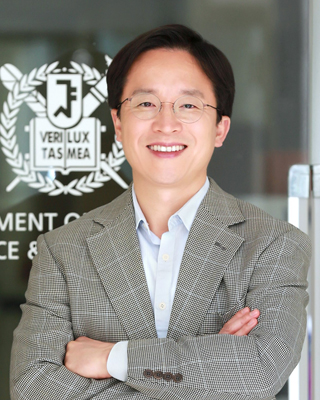AI Semiconductor &
SNU College of Engineering
Professor Ho Won Jang

Seoul National University
Semiconductor research stands as a pivotal driver of technological progress and shapes the trajectory of innovation in myriad industries. As we look ahead to an increasingly interconnected and AI-driven future, the significance of advancing semiconductor technology cannot be overstated. Within Seoul National University (SNU)’s esteemed College of Engineering, a distinguished group of professors is at the forefront of next-generation semiconductor research, each contributing their expertise to propel the field forward.
Professor Cheol Seong Hwang leads pioneering research in the development of new memory materials tailored specifically for energy-efficient AI hardware. Recognizing the indispensable role of memory storage in AI systems, Professor Hwang's work focuses on developing materials optimized for energy efficiency. His research holds promise for addressing the escalating demand for sustainable computing solutions, which are vital for supporting the proliferation of AI-driven technologies in our increasingly digital landscape. Professor Gwan-Hyoung Lee is a pioneer in developing innovative techniques for the synthesis and 3D integration of 2D materials, with a particular emphasis on enhancing AI computing capabilities. By leveraging the unique electronic properties of 2D materials, Professor Lee's research aims to elevate the performance and efficiency of AI hardware. Through novel synthesis methods and intricate integration techniques, his goal is to unlock new avenues for AI-driven innovations. Professor Min Hyuk Park explores the development of materials engineered to be neuromorphic. Inspired by the intricate neural networks of the human brain, Professor Park endeavors to create materials that possess cognitive capabilities. This research not only lays the groundwork for the development of brain-inspired computing devices but also unlocks new possibilities for advancements in AI-driven technologies.
Professor Chul-Ho Lee delves into ultimately scaled 2D semiconductor electronics for beyond-CMOS and AI technology. As traditional CMOS technology approaches its limits, Professor Lee explores the potential of 2D semiconductor electronics to usher in a new era of computing. His research holds the promise of unlocking unprecedented levels of computational power and efficiency, crucial for powering the future of AI-driven technologies. To address the critical need for energy-efficient computing solutions, Professor Jong-Ho Lee specializes in low-power AI semiconductors tailored for high-performance neural networks. His research focuses on designing semiconductor devices with minimal power consumption, without compromising performance. This work lays the groundwork for sustainable AI systems capable of operating efficiently in resource-constrained environments. Professor Woo Young Choi's expertise lies in extremely low-power semiconductor devices for sustainable AI. With a focus on reducing power consumption to promote environmental sustainability, Professor Choi's research aims to develop semiconductor devices that can operate efficiently while minimizing their carbon footprint. His work aligns with the growing emphasis on sustainability in technological innovation, paving the way for a greener future.
Meanwhile, Professor Sangbum Kim leads research in device-algorithm co-optimization for analog in-memory computing. His work focuses on intricately fine-tuning the interaction between hardware devices and algorithms, with the objective of unlocking the full potential of analog computing systems. Through this optimization process, Professor Kim endeavors to enhance the efficiency and functionality of computing architectures, paving the way for transformative advancements in computational capabilities. Professor Jae-Joon Kim specializes in algorithm/hardware co-design for efficient AI computing. Acknowledging the symbiotic relationship between algorithms and hardware components, Professor Kim's research aims to optimize their interplay to achieve superior performance and energy efficiency in AI systems. His work holds immense promise for powering the next generation of intelligent technologies, spanning industries from healthcare to autonomous vehicles. Charting the course towards the future of computing, Professor Jae W. Lee leads research in new computer design for the age of generative AI and beyond. With a keen eye on emerging AI technologies, Professor Lee seeks to design computer architectures optimized for the demands of generative AI algorithms. His work holds the potential to unlock new frontiers in AI-driven creativity and innovation.
Together, these esteemed professors exemplify the spirit of innovation and excellence that defines Seoul National University's College of Engineering. Their groundbreaking research not only pushes the boundaries of semiconductor technology but also shapes the path of technological progress for generations to come. As we stand on the threshold of a new era defined by AI, connectivity, and sustainability, their contributions will serve as the cornerstone of a brighter, more interconnected future.